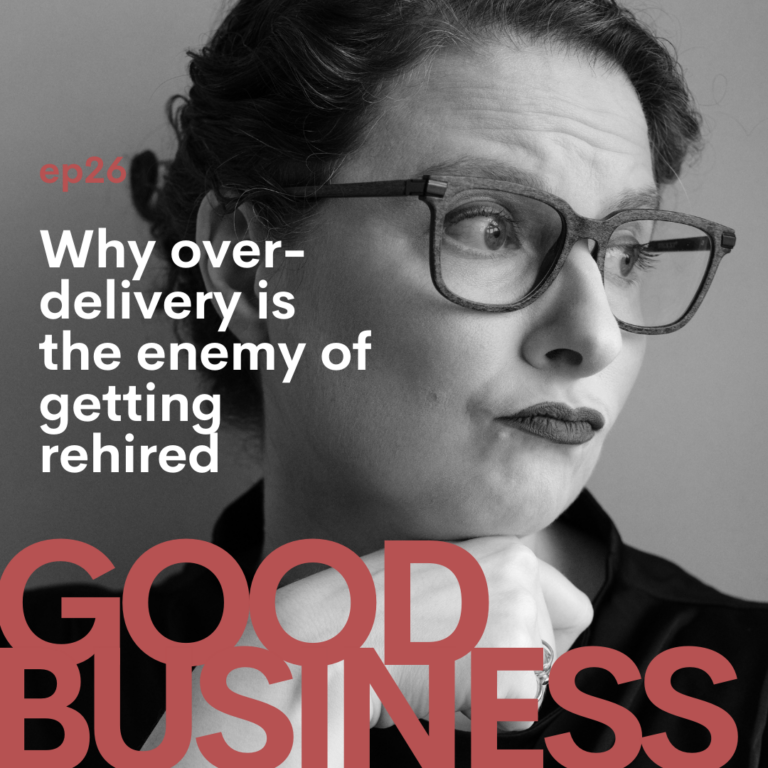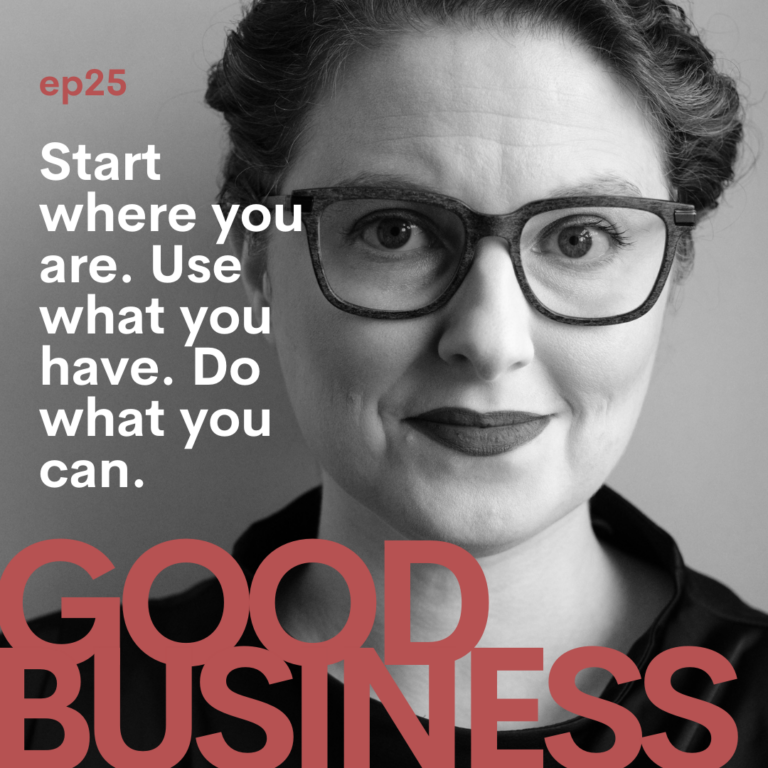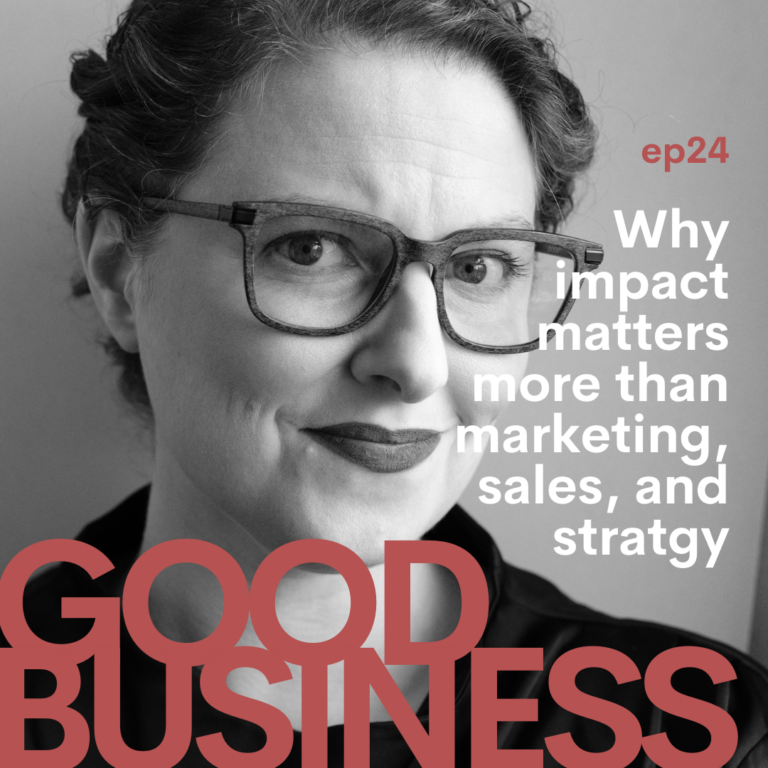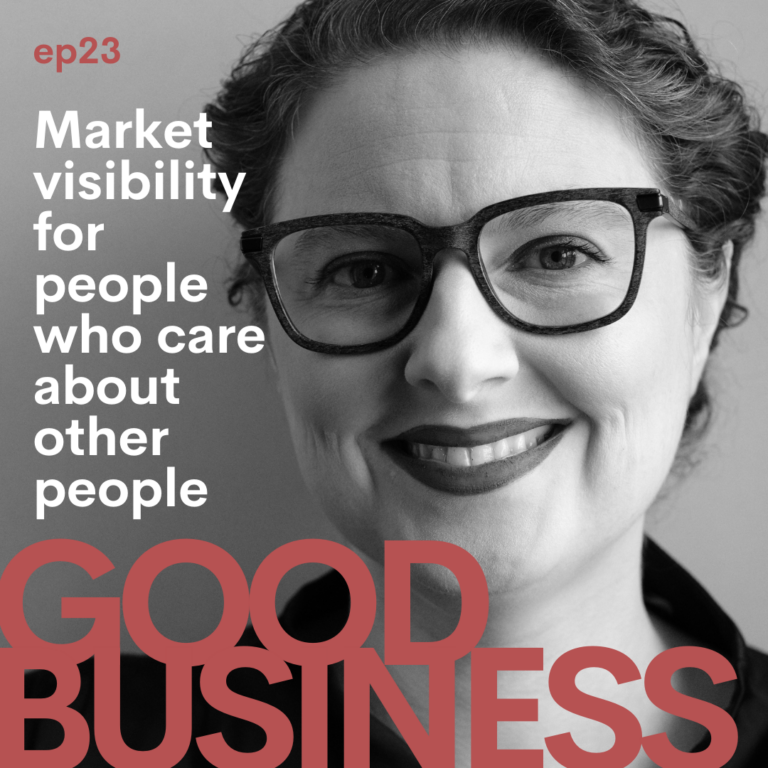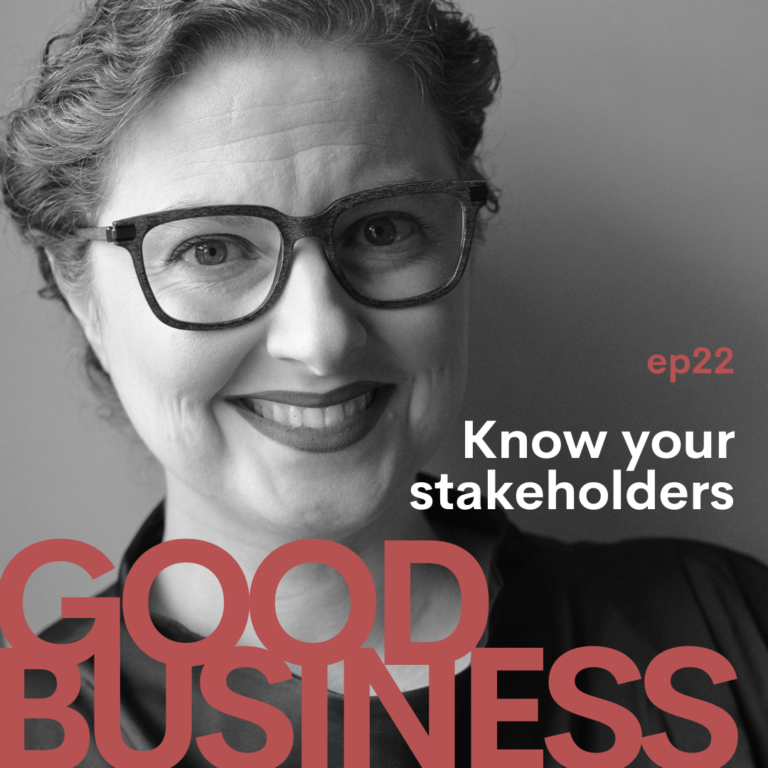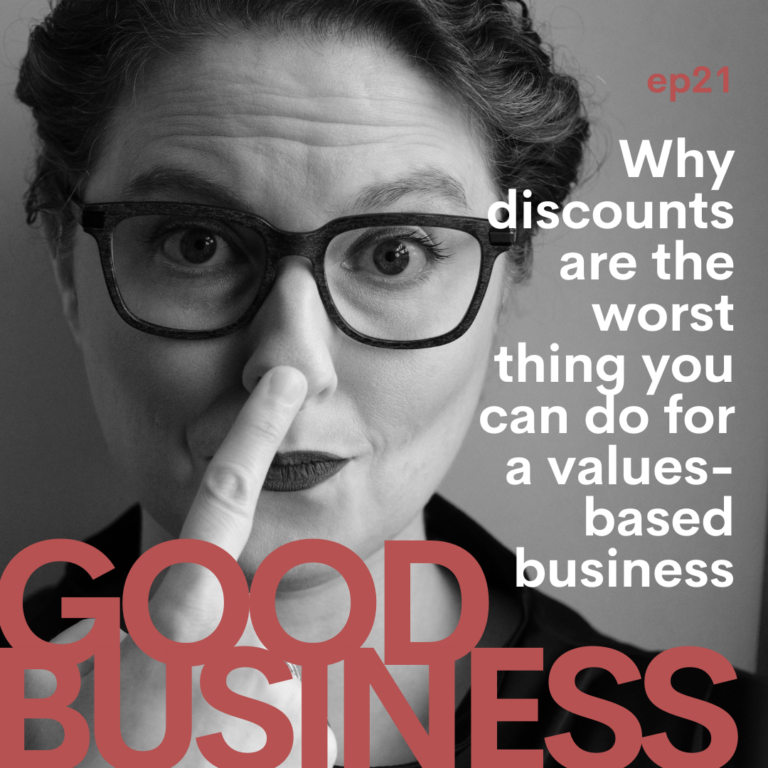Episode Transcript:
I’m Illana Burk, CEO of your life’s work shop, coached entrepreneurs and solopreneurs across dozens of industries and host of good business with nearly 20 years experience helping hundreds of clients create profitable, ethically driven and sustainable businesses based on their life’s work. I’m here to teach you how to do great work, make great money, and make a positive impact without feeling like you need a shower afterwards.
Hi everybody. Today’s episode is all about the last frontier of content marketing. The bold notion that you can tell the whole truth and people will buy whatever you’re selling. It’s a revolution. I know. So we as a culture are so used to being sold to all the time. We all know this, right? Most estimates clock us up clock our daily add consumption at around 5,000 messages per day and 4,999 of those. We’ll basically follow the same few manipulative rules that we all know. Create a problem, targeted problem, promise to solve a problem. Repeat, but what about the one, the one in 5,000 the one that’s not those 4,999 messages that are all basically the same. If you can be the one who has something else to say, you win. That’s how it works. So this episode was inspired by the fact that one of my clients recently showed me this totally awesome business that’s bringing truth telling to like whole new heights.
It’s, it’s a $1 grilled cheese food truck and this is a viral post. You guys probably saw this going on Facebook and stuff, right? So my favorite posts from their Twitter feed reads, giving people any choices, slows everything down the line, the wait time, the prep time, getting people to correct order everything. I want the currency in your wallet to be the only variant. Once you’re in line. My model is one thing done just okay, but dirt cheap so you don’t care. Literally the only thing they sell is $1 mediocre grilled cheese. No drinks, no nothing, no tomato soup, Nada, $1 grilled cheese. Simple. He doesn’t promise to do anything other than that. And delivers on exactly what he’s promising. His Twitter feed includes like an epic level of truth. It’s fantastic. The guy’s name is, well, at least a screen name is called Daniel Danger. You can find him @tinymediaempire and you might be my new favorite person. He also happens to be an incredible illustrator. I was totally blown away by the other stuff. This guy does his, his work is really amazing and you should check them out. So now the idea of telling the truth obviously isn’t new and plenty of marketing is, but there’s actually a really significant difference between technically telling the truth or at least part of it and being actually honest. See, we as marketers own know what people want to hear to trigger buying choices. It’s not a secret. And we have all been doing basically the same thing for decades and the byproduct is a really hungry humanity. We are desperate. We as humanity, not as marketers, right? We are desperate for something different, something new, hence the rise and probable impending fall of influence, more influence or marketing.
We want things to that feel more real. And in the case of influence, influence, or marketing, it only feels real until it doesn’t. And the world is getting bored wise, jaded. It’s just like there’s too much. There’s too much of everything. So in the land of fake news and second long attention spans, people are changing. We’re craving just about anything that feels trustworthy and what’s more trustworthy than just putting all of yourself out there. Warts and all right, like what? What could be more trustworthy than, than somebody who’s not afraid to just be exactly who they are? No, don’t get me wrong. I’m not odd. Advocating for oversharing is a marketing methodology. In fact, on the contrary, you can be fiercely honest and say way less than everyone else because the kind of honesty I’m talking about is laser focused and it follows three basic concepts.
The first is know yourself and your product. The second is talk about what matters to you and your customers equally. Put yourself on a level playing field. And the third is pay attention to what pisses you off and avoid it by telling people about it and inviting those elements to go elsewhere. So first I’m going to articulate those a little bit more. Know your product. If it’s good, say it’s good. If it’s not, say it’s not. If it’s great, say it’s great, but if it’s just good, don’t say it’s the best that ever was. Just say it’s good. So no where you stand in comparison to the competition and price yourself accordingly. Mark it accordingly. If it’s mediocre, but she say so, that doesn’t mean people won’t buy it. In fact, it probably means they will and they’ll be satisfied because you didn’t over promise and under deliver.
So second, talk about what matters to you and your customers equally. And what I mean by that is if you want your work to be fun, say so. If you want them, the people coming and buying from you to have a good time, tell them that and deliver it. If you want your product to make them feel better about themselves. But if your product, excuse me, if your product will not make them feel better about themselves, but it will help them get better at something, tell them that it will help them get better at something. But will not the bubble, not make them feel better about themselves. But the basic idea is that you matter as much as your clients treat them as such, and they’ll return the favor. The customer’s not always right. So third, pay attention to what pisses you off and avoid it by telling people about it and inviting those elements to go elsewhere.
What I mean by that is if you do not want to deal with people who only want x, then you say, if you only want x, go elsewhere. Ask for what you want. Say what you don’t, and you’ll have a way higher chance of getting both. Here’s my version for my coaching practice because I practiced what I preached on this one, right? So this is what I tell people. If you want to make a pile of money super fast, good luck with the lottery. If you want to take a really long time to peel back all of your most, all the layers of your most tender bits and uncover where you’re actually made of and that thing may or may not make you money, then sign up here. I’m your girl.
Yeah, it will be hard. It will be painful and it will probably be rewarding or you’ll get overwhelmed halfway through and you’ll decide it’s not worth it either way. If you want to work with someone who will tell you what to do and who’s right a lot more than she’s wrong, let’s talk. I’m priced somewhere in the middle. I’m not the highest and I’m not the lowest. I try to keep it fair and that’s it. It’s that simple. I’ve been using some variant on that little spiel that I just gave you for the last 10 years in my coaching practice and almost anyone I’ve ever said it to signs on the dotted line and ends up very, very happy with the coaching relationship that they form with me. So with that, I invite you to be honest and I bid you adieu. I hope you have a better than average day and nothing terrible happens to you. Good luck out there, everyone. Have a great day.
So thanks so much for hanging out with me today. For more information, visit thegoodbusiness.co or lifesworksdev.wpengine.com.
More Episodes
Why overdelivery is the enemy of getting rehired | GB26
Today’s episode is all about why over-delivering is a really good way to not get asked back for more work. We all think doing our best and giving more than people asked for is a good thing. And in some ways, it is. Things like adding extra value to something you do is fine. What I’m talking about is when you completely blow the scope of what was asked of you out of the water. It’s one of the hardest things to identify when you’re trying to figure out why no one seems to hire you twice.
Start where you are. Use what you have. Do what you can. | GB 25
Today’s episode of The Good Business Podcast is all about my very favorite quote in the whole world. “Start where you are. Use what you have. Do what you can.” by Arthur Ashe
Why impact matters as much as marketing, sales, or strategy. Maybe more. | GB24
Today’s episode is less of a lesson than recent episodes. Instead, today we’re making a case for a topic we’ll be talking a LOT more about in the future: IMPACT. What it is. Why it matters. And how to pay attention to it.
Market visibility for people who care about other people | GB23
Today is a branch off of our stakeholder conversation. If you listened to that episode, you should have a clear picture of exactly who matters to you and your work and why, as well as how much time you have for your work without sacrificing what those VIPs need and expect from you. Next up, we talk about exposure, protection, and the responsibility you have to those who matter most.
Know Your Stakeholders | GB22
In this episode, I’m going to walk you through how to think about establishing your stakeholders, the steps you need to take to do so, and how to make decisions based on who they are without compromising those big fat dreams we’ve been talking about.
Pricing Basics: Why discounts are almost never a good idea | GB21
Today’s episode dovetails on our last one, where we talked all about how your value isn’t determined by your price tag. Today, we’re talking about discounts. First, we’ll talk about why businesses offer them, what their purpose is and when they ARE a good idea. Then we’ll talk about why they are probably a bad idea for you and what to do instead.

